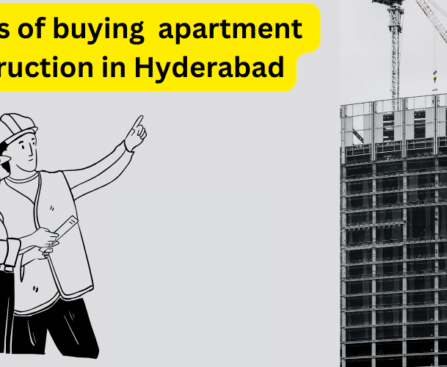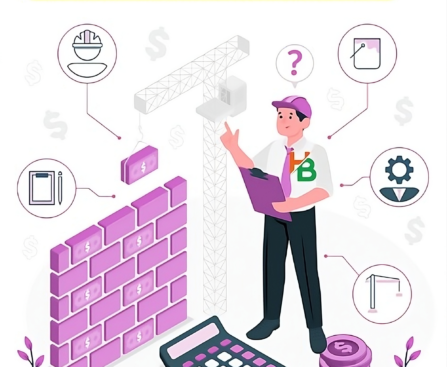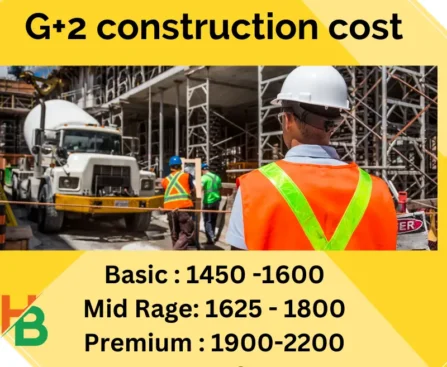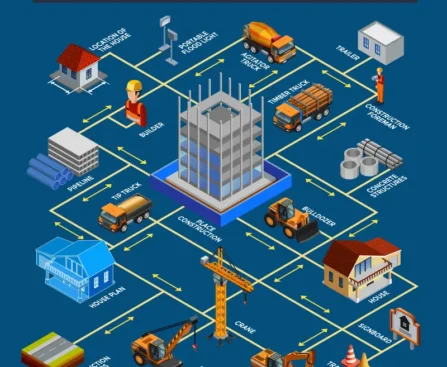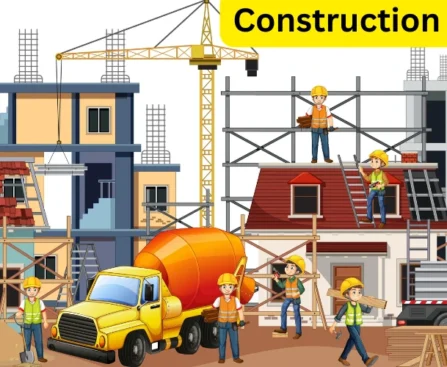Are you considering investing in property an under-construction in Hyderabad? It’s a decision that offers both potential benefits and drawbacks. In this comprehensive guide, we’ll delve into the advantages and disadvantages of buying under-construction properties in Hyderabad, helping you make an informed choice. Pros of Buying apartment Under Construction in Hyderabad More Economical Initially: Investing in under-construction properties in cities like Hyderabad can be cost-effective. Builders often offer attractive discounts and incentives to early buyers as they kickstart their marketing efforts after gaining RERA approval and GHMC permits. This is the time to secure your dream property at a lower cost. Better Choice of Unit: When you opt for under-construction properties, you have a wider range of units to choose from, especially if you’re an early bird. You can snag the best units, preferred locations, and even units with favorable Vastu orientations. Staggered/Lower Outflow of Money: Financing your property purchase becomes more manageable with under-construction units. The financial burden is not sudden, which is particularly advantageous if you’re taking a home loan. This ensures that your disposable income isn’t drastically reduced. Protection Against Future Price Increases: Hyderabad’s real estate market is dynamic, and property prices tend to rise as construction progresses. Early buyers lock in their investments at lower prices before the market sees an upswing. Design Flexibilities: You may have unique requirements for your dream home. there is alot of flexibility who you choose apartment under construction in Hyderabad as it often allow for great customization time and plan, such as internal changes, fixtures, and fittings, provided they don’t affect the building’s structural stability. Investment with Better Appreciation Prospects: Many investors buy apartments under construction, banking on future profits. Factors like location, builder reputation, project attractiveness, and design elements play a crucial role in securing a property with excellent appreciation potential. Engagement with Builders: With an Apartment under construction , you can actively engage with the builder. You have the opportunity to inspect the construction progress, building materials used, and even question the builder if any concerns arise. RERA Oversight Against Delays: Hyderabad’s real estate market is now governed by Ts RERA (Telangana Real Estate Regulatory Authority) regulations. If your builder fails to deliver possession within the prescribed timeframe, ts RERA provides legal recourse. This safeguards your investment against undue delays. Cons of Buying apartment Under Construction in Hyderabad Delayed Possession: One of the significant downsides of under construction properties is the risk of delayed possession. Factors like funding issues and regulatory delays can push the project timeline, potentially resulting in additional rent or mortgage payments for you. Uncertainty: There’s inherent uncertainty regarding the final product’s quality when investing in under-construction properties. While builders may have plans in place, changes during construction can be unpredictable, leading to differences from the initial promises. Additional Costs: Besides the property’s base cost, under-construction properties may come with additional expenses like maintenance charges or parking fees. Construction delays can also lead to extra financial burdens. Risk of Cancellation: In rare cases, projects may be canceled by developers, resulting in significant financial losses for buyers. This risk should be considered before making a purchase. Changes in Market Conditions: The real estate market’s volatility can affect the property’s value. Market downturns can reduce your property’s worth, impacting future selling or renting prospects. Difficulty in Selling: If you’re purchasing for investment purposes, there’s no guarantee that you can sell under-construction properties for a profit upon completion. Market competition and local policies can make it challenging to find buyers. Tips for Selecting Apartment Under-Construction in Hyderabad Step 1: Research the Builder Thoroughly research the background of the builder, including their reputation, experience, and track record. Examine their past projects to look the quality of construction and timely delivery. Read customer reviews and testimonials to understand the builder’s reliability and customer satisfaction. Step 2: Location Matters Choose a well-connected location in Hyderabad with essential amenities like schools, hospitals, and public transport options. Consider proximity to key infrastructure such as bus stations, Hyderabad Metro Rail (HMRD), Rajiv Gandhi International Airport, and other transportation hubs. Assess the potential for future development and appreciation in the chosen location. Try to choose an apartment under construction outside the industry and factories their might be chance of air pollution and water contamination Step 3: Legal Due Diligence Hire a professional legal adviser or lawyer to conduct a thorough legal due diligence process. Verify all legal documents related to the property, including land titles, approvals, permits, and land use certificates. Ensure there are no disputes or pending litigation associated with the property. Step 4: Amenities and Features Consider the amenities and features offered by the under construction in Hyderabad to enhance your quality of life. Look for recreational facilities, including a clubhouse, indoor and outdoor sports facilities (e.g., tennis courts, badminton courts), jogging tracks, and multipurpose courts. Assess the presence of green spaces like landscaped gardens and open areas. Check for community and entertainment options such as a community hall or party area and a visitor lounge or waiting area. Evaluate security and technology features, including CCTV surveillance, intercom facility, and smart home automation systems. Examine environmentally conscious features like a rainwater harvesting system and waste management and recycling facilities. Consider convenience and comfort amenities such as guest parking, a yoga or meditation room, health and wellness facilities (e.g., spa, sauna), retail stores or shopping complexes within the project, senior citizen-friendly amenities (e.g., seating areas, elder care services), and pet-friendly features (e.g., pet parks, grooming stations). Step 5: Payment Plan Understand the payment plan provided by the builder in detail. Ensure that the payment plan aligns with your budget and financial goals. Be aware of any hidden charges, taxes, or maintenance costs associated with the property. Verify the payment milestones throughout the construction phase, including down payments and EMIs. Consider the availability of pre-approved home loans if you plan to finance your purchase through a loan. Check if there is any delay in construction do you need to pay extra Step 6: Building
House Construction cost Calculator Built-up Area (sq. ft): Cost per Sq. Ft (in rupees): Calculate Construction Summary Material Quantity Percentage Category Cost (in rupees) Percentage Total Cost What is the cost of construction per sq ft in 2024 March? “In 2024 March present average construction cost in Hyderabad ₹1550 to ₹1850 per sft from basic from 1400-1500 and premium class from 1800-2200 [ersft it varies significantly from one location to another , quality to quality and the building materials used in construction and the building construction company you hire . For example, construction costs in a village are typically less expensive per square foot than those in cities. This variance is influenced by multiple factors, including the availability of materials, labor, and sand supply. Factors such as the type of materials and furniture used, as well as the cost of transportation, also play a crucial role. In particular, in Hyderabad, the construction cost per sq ft can differ significantly depending on whether you opt for high-quality materials versus lower-quality materials. To obtain a more accurate estimation, it is advisable to contact the local contractor for the exact cost. Hyderabad Construction Cost Using Builder (Both Material + Labor Outsourced) Category Value Area of Construction 1000 Sq Ft Construction Estimate 17,25,000 Rs Standard Construction Cost per Sq Ft in 2024 1725 Rs Residential Construction Cost per 1000 Square feet in Hyderabad (Material provided by self + Labor Outsourced) Quality Basic Sandard Premium Area of Construction 1000 Sft 1000 Sft 1000 Sft Construction Cost Estimation Rs 14,00,000 Rs 16,50,000 Rs 22,50,000 Residential Construction Cost per Sq Ft with material ₹14,00 sq ft ₹1625 sq ft ₹2250 sq ft Residential Construction Cost per Sq Ft without material 250 sq ft ₹325 sq ft ₹400 sq ft You can reduce 75-100 per sq ft if you material is provided by you and if you order all the material in bulk cost of construction per sq ft Hyderabad per sft Commercial Building construction cost in Hyderabad Construction scenario Area of Construction Construction Estimate Construction Cost per Sq Ft In Hyderabad Material Arranged by Self, Only Labor Outsourced 1000 sq ft 15,50,000 Rs 1550 sq ft + 325 sq ft =1875 INR/ sq ft Commercial Building construction cost (Material + Labor Outsourced) 1000 Sq Ft 19,25,000 Rs Rs 1925 INR 100 sq yards C onstruction cost 1 square yard is equal to 9 square feet, not 900 square feet. So, 100 square yards would be equal to 100 yards×9 sq ft/yard=900 sq ft Now, let’s proceed with the calculation based on the corrected conversion: House Construction cost for 900 sq ft at 1625 rupees per sq ft: 1625 rupees/sq ft×900 sq ft=₹14,62,500 Additional costs: Permission: 30,000 rupees30,000rupees Bore (700 sq ft): 1,00,000 rupees1,00,000rupees Pump: 78,000 rupees78,000rupees Meter: 10,000 rupees10,000rupees Total additional costs: 30,000+1,00,000+78,000+10,000=2,18,000 rupees 30,000+1,00,000+78,000+10,000=2,18,000rupees Grand total: ₹14,62,500+₹2,18,000=₹16,80,500 Additionally, you mentioned an interior cost of 3,00,000 rupees Therefore, the overall cost for construction, including permission, bore, pump, meter, and interior work, would be ₹16,80,500+3,00,000 rupees=19,80,000 rupees 200 sq yard Construction cost Caluculator: House Construction Cost for 200 sq yards (1800 sq ft): 1625 rupees/sq ft×1800 sq ft=₹29,25,0001625 INR /sq ft x 1800 sqft=₹29,25,000 Additional Costs: Permission: ₹30,000 Bore (700 sq ft): ₹1,00,000 Pump: ₹78,000 Meter: ₹10,000 Total Additional Costs: ₹2,18,000 Overall house Construction Cost (including additional costs): ₹29,25,000+₹2,18,000=₹31,43,000₹29,25,000+₹2,18,000=₹31,43,000 Interior Cost (Range): Lower Bound: ₹4,00,000 Upper Bound: ₹6,00,000 Overall Cost (including construction, additional costs, and interior): Lower Bound: ₹31,43,000 + ₹4,00,000 = ₹35,43,000 Upper Bound: ₹31,43,000 + ₹6,00,000 = ₹37,43,000 Therefore, with the construction cost of ₹1625 per square foot in Hyderabad, the overall cost, considering construction, additional costs, and interior work, would range from ₹35,43,000 to ₹37,43,000 for a construction area of 200 square yards. this is Standards construction cost Effect of GST in Construction Moreover, the report indicates that the introduction of GST has somewhat reduced the total cost of construction. To understand the effect of GST on the cost of construction in Hyderabad, an evaluation of the pre-GST tax rates compared with the current taxation system was conducted. The implementation of GST has marked the end of tax variation issues, not just in the real estate market in Hyderabad but across all industries. GST introduces countrywide uniform taxes, and the system mandates builders to purchase products from registered suppliers, thereby reducing ambiguity. The impact of taxation on various construction components seems to vary; however, GST has generally reduced the total cost of construction to a certain extent. Before you dive in to the construction cost you need to know about few terms Comparing Residential Construction Cost in Hyderabad vs Delhi vs Mumbai Understanding Hyderabad’s Competitive Edge in Construction Cost As we step into 2024, a discerning analysis of the construction cost in Hyderabad reveals a compelling narrative for those interested in the real estate sector. When considering the investment in a luxury residential apartment in Mumbai, one can expect to encounter construction costs ranging between Rs 1700 to Rs 2500 per sq ft. In stark contrast, Hyderabad presents a more economical scenario with construction costs hovering around Rs 1800 per sq ft for house construction. This affordability becomes even more pronounced when Hyderabad’s rates are juxtaposed with other Indian metropolises like Bengaluru, Pune, New Delhi, and Chennai. It’s noteworthy that Mumbai’s construction expenses surpass these cities by approximately 10%. This makes Hyderabad’s real estate market particularly attractive, offering construction costs approximately 14% lower than Mumbai, the most expensive city for construction in India. Comparing Commercial Building Costs: Mumbai vs. Hyderabad vs. Delhi Looking deeper into the commercial industry, the cost dynamics shift intriguingly. When we look at the costs of building commercial properties, there’s a noticeable difference between cities. Let’s break it Down 2024 Construction cost by city wise in India City Construction Cost (per square feet) Note Mumbai Rs 2100 – Rs 2500 per sq ft High compared to other cities Delhi Rs 2600 – Rs 2860 per sq ft Higher than Mumbai Hyderabad Rs 1700 – Rs 1900 per sq ft Budget-friendly option Kochi Rs 1500 – Rs 1850 per sq ft Covers basic materials and labor Bangalore Rs 1650 – Rs 1900 per sq ft Increased
What is G+2 building? A G+2 building refers to a structure that consists of a ground floor plus two additional floors above it. This type of construction is common in both residential and commercial architectural projects. Factors Influencing G+2 Construction Costs The construction costs of any building, including a G+2 structure, are influenced by several key factors: Land Costs: Location and Size: Costs escalate in prime locations and for larger plots. Accessibility and proximity to amenities also significantly influence land value. Cost Variations: Labor costs can vary significantly based on the project’s location, the complexity of the work, and the skill level of the workers. This is a critical factor in the overall construction budget. Type of Builder: Small Builders: Offer personalized services and may have lower costs. They might, however, have limitations in resources and scalability compared to larger firms.Corporate Builders: Generally have more extensive resources, which can mean faster project completion and potentially higher efficiency. Their services may come at a premium due to their brand reputation and resource availability. Design and Architectural Features: Complexity of Design: More intricate and complex designs necessitate extensive planning, materials, and labor, leading to higher costs.Choice of Materials: The price varies based on the quality and branded construction materials. High-end or specialized brands tend to be more expensive.Aesthetic Considerations: Custom features such as unique Doors and windows or detailed facades can substantially increase costs. Local Building Regulations and Permits: Compliance Costs: Meeting local building codes often involves additional design and construction expenses.Permit Fees: These vary by location and project scope and are an essential factor in the overall budget. G+2 Construction cost Building cost per square foot (sft) G+2 Construction Cost: The construction cost for a G+2 (Ground plus 2 Floors) building involves various components, each contributing to the overall expense. Here’s an overview of these components with price ranges: Labor Cost: Construction labor cost , ranging from Rs. 270 to Rs. 350 per square foot(sft), covers the wages of construction workers and skilled tradespeople involved in the project. The cost can vary based on location, labor availability, and project complexity. Material Cost (sand, bricks, stone chips): Material cost, with a range of Rs. 275 to Rs. 341 per square foot, includes expenses for construction materials like sand, bricks, stone chips, and aggregates. The quality and source of construction building materials can significantly impact overall costs. Cement and Iron: Cement bags concrete and tmt bars , each priced at Rs. 110 per square foot, are fundamental components of the building’s structural framework. Cement is used in concrete and mortar, while iron is crucial for reinforcing structures like columns and beams. Flooring (including material and labor): Flooring cost, varying from Rs. 88 to Rs. 165 per square foot, covers both the materials used for the floor, such as tiles, hardwood, or concrete, and the labor required for installation. The choice of flooring material and its quality can influence the overall cost. Sanitary (including plumbing): The sanitary component, with costs ranging from Rs. 66 to Rs. 88 per square foot, encompasses expenses for sanitary fittings, plumbing pipes, and fixtures like sinks, toilets, and showers. This cost includes both materials and labor for installation, as plumbing work is essential for water supply and drainage systems. Electricals (including labor and material): Electrical cost, fixed at Rs. 110 per square foot, comprises the materials needed for wiring, switches, outlets, lighting fixtures, and the labor involved in electrical installations. Electrical work is crucial for providing power and lighting throughout the building. Windows, Grills, Paint, Plaster (exterior): This component, with costs ranging from Rs. 137.5 to Rs. 192.5 per square foot, includes expenditures related to the building’s exterior, such as windows, grills, exterior paint, and plasterwork. Costs cover both materials and the labor involved in installation and painting. Miscellaneous (Water tanks, security, etc.): Miscellaneous costs, with a range of Rs. 77 to Rs. 99 per square foot, comprise various additional items necessary for the building, including water tanks, security features like CCTV cameras and fire alarms, and other unforeseen expenses that may arise during construction. Municipal Work (permits and plans): Municipal work costs, fixed at Rs. 110 per square foot, involve the process of obtaining building permits and plans from local authorities for the construction project. These costs include fees associated with approvals, inspections, and compliance with building codes and regulations. Additional G+2 construction cost for : Adding a basic lift (elevator) costs Rs. 120 to Rs. 160 per square foot. Strengthening the foundation via piling (not recommended for small construction) increases the cost by Rs. 60 per square foot. Using highly premium products results in an increased cost of Rs. 270 to Rs. 360 per square foot. Estimated total costs for different types: Total G+2 construction cost come down to There are three types of construction:Basic Construction G+2 Construction Cost Basic G+2 Construction Cost (1450 – 1600 Rs per sq ft): Basic construction represents a cost-effective option, with a cost range of 1450 Rs to 1600 Rs per square foot. This level of construction is characterized by the use of standard materials and finishes, making it suitable for projects with budget constraints. Materials used are typically of moderate quality, and the design tends to be straightforward without many decorative elements. Basic construction provides a functional and practical space without extravagant features, making it an ideal choice for individuals and small builders or startup builders looking for budget-friendly options. Standard G+2 Construction Cost(1625 – 1800 Rs per sq ft): Standard construction strikes a balance between cost and quality, with a cost range of 1625 Rs to 1800 Rs per square foot. This level of construction offers improved materials and finishes compared to basic construction, providing greater durability and aesthetics. Materials used in medium construction may be of higher quality, allowing for more design flexibility and customization options. Medium construction is suitable for those seeking a decent level of quality and customization without overspending, and it is often undertaken by small to medium-sized builders with 3 to 5 years of experience. Premium G+2 Construction
Introduction: Embracing the Future of Construction Technology In the ever-evolving landscape of the construction industry, 2024 marks a pivotal year where technological innovation is not just a luxury but a necessity. As we step into this era, it’s evident that the adoption of advanced construction technologies is revolutionizing the way we build, design, and conceptualize structures. From towering skyscrapers to residential homes, these groundbreaking technologies are reshaping the construction sector, making processes faster, more efficient, and remarkably sustainable. The significance of this technological revolution cannot be overstated. It’s not just about the implementation of new tools or machines; it’s a complete overhaul of traditional construction methodologies. These innovations are driven by a need to address contemporary challenges such as environmental sustainability, resource efficiency, and the ever-growing demand for complex, yet cost-effective building solutions. As we delve into the depths of these technologies, from 3D printing to the Internet of Things (IoT), and from smart materials to prefabrication, we witness a transformative era where construction is no longer bound by the limits of yesterday’s practices. This article aims to provide an insightful exploration into the various facets of modern 11 Latest construction technologies. 3D Printing Augmented Reality (AR) Internet of Things (IoT) Robotics Advanced Materials Prefabrication and Modular Construction Blockchain Sustainable and Green Building Practices Construction Software 5G Technology Laser Scanning and LiDAR Each section will unveil how these advancements are not just conceptual dreams but practical realities shaping our physical world. As we navigate through each technology, it becomes clear that the future of construction is here, offering opportunities to build smarter, safer, and with a vision that aligns with the needs of our evolving world. 3D Printing: Redefining Construction with Versatility and Innovation The realm of 3D printing in the construction industry is a vivid testament to technological advancement, offering a blend of versatility, efficiency, and creativity. This method, transcending the traditional boundaries of construction, uses an array of materials ranging from concrete to metals and advanced polymers, each bringing unique properties and possibilities to the table. The capability to print layers upon layers with precise control allows for the creation of intricate and complex designs that were once deemed impossible or highly impractical with conventional construction methods. A significant advantage of 3D printing lies in its approach to minimizing waste. Traditional construction often leads to excess materials that contribute to environmental strain. In contrast, 3D printing is inherently more sustainable, using only the necessary amount of material, thereby reducing waste and promoting eco-friendly practices. This efficient use of resources is not just an environmental boon but also a cost-effective solution, particularly important in today’s economically conscious world. The practical applications of 3D printing in construction are not just theoretical but have been realized in various projects globally. For instance, in the Netherlands, a 3D-printed concrete bridge was constructed for cyclists, showcasing the potential of this technology in creating robust and functional structures. Similarly, in Dubai, the world’s first 3D-printed office building stands as a remarkable example of how this technology can be effectively scaled for larger projects. These examples underscore the practicality and scalability of 3D printing in construction, marking it as a cornerstone technology of modern architectural endeavors. In 2023 Indian given showed green flag for first 3d printed post office Source: Indiatoday As we continue to explore the potential of 3D printing, it’s clear that this technology is not just a fleeting trend but a pivotal part of the future of construction. It opens up new avenues for architectural expression, efficient resource use, and sustainable development, making it a key player in the construction industry of 2024 and beyond. Augmented Reality (AR) in Construction Augmented Reality (AR) in construction is revolutionizing the way architects, engineers, and builders visualize and interact with their projects. By overlaying digital information onto the physical world, AR provides a dynamic and immersive experience, enabling professionals to see the finished product before the first brick is laid. This technology plays a pivotal role in bridging the gap between conceptual designs and physical reality, allowing for a more comprehensive understanding of how a structure will materialize in its environment. On construction sites, AR is proving invaluable. Workers equipped with AR headsets or mobile devices can access vital information in real-time, directly overlaid onto their field of view. This immediate access to data reduces errors and improves efficiency, ensuring that projects adhere closely to their planned designs. Furthermore, AR enhances training and safety protocols. By simulating real-world scenarios, workers can train in a risk-free environment, gaining experience and knowledge that directly translates to safer, more effective on-site practices. Augmented Reality (AR) boosts productivity by 32% and slashes task completion times by 46%, as per IBM’s research. This technology is revolutionizing employee training and onboarding, potentially saving U.S. companies $413 billion annually in informal training costs. source: frobes One notable example of AR in action is in the construction of complex infrastructure projects. For instance, in the construction of a new subway system, AR has been used to overlay the intricate network of tunnels and stations onto the existing cityscape, providing a clear and comprehensive view of the project’s scale and scope. Similarly, AR has been utilized in the restoration of historical buildings, allowing architects to superimpose proposed restorations onto the existing structure to assess compatibility and impact. Internet of Things (IoT): Enhancing Construction through Connectivity and Real-Time Insights The integration of the Internet of Things (IoT) in construction marks a significant leap towards smarter, more connected building processes. By embedding sensors and devices throughout construction sites, machinery, and even within the materials themselves, a continuous stream of data is captured and analyzed, providing insights that were once beyond reach. This interconnected network of IoT devices is transforming how construction sites operate, making them more efficient, safe, and responsive. One of the foremost benefits of IoT in construction is its capacity for real-time monitoring and analytics. By tracking everything from equipment performance to environmental conditions, project managers can make informed, timely decisions, reducing downtime and optimizing workflows. Equipment
Construction labor cost in India Introduction: Constructing a building, whether it’s a residential home or a commercial structure, involves several key elements, and one of the most significant components is construction labor cost. Labor costs play a crucial role in determining the overall expense of a construction project and are influenced by various factors. In India, a country with diverse construction practices and a booming real estate industry, comprehending construction labor costs is essential for effective project planning and budgeting What is Labor cost in Construction: Labor cost in construction refers to the total financial expenditure associated with employing and compensating the workforce engaged in building or renovating a structure. This includes wages, benefits, taxes, training, and any additional expenses related to the employment of construction workers. Labor cost is a key component of the overall budget for construction projects, impacting the financial planning and feasibility of such endeavors. Labor Rate If you hire a contractor When hiring a labor contractor for house construction, the house construction labor rate typically ranges from ₹250 to ₹350 per square foot in India . Before engaging a contractor, it’s crucial to draft a comprehensive agreement outlining various aspects of the project. This agreement should specify the scope of work, payment structure, material responsibilities, project timeline, permits, insurance requirements, change orders procedure, termination conditions, and a dispute resolution mechanism. Signatures from both the house owner and the labor contractor confirm mutual understanding and commitment to the agreed terms. 2024 Construction Labor cost price list(civil works) in India Total labor rate for House construction Total building construction labour rate per square feet is Rs. 250 to Rs. 350 per sqft (Materials excluded ) labor rate for Brickwork & Blockwork(with out material): 4 inch brick/block work: Rs. 18 to Rs. 20 per sqft 6 inch brick/block work: Rs. 24 to Rs. 26 per sqft 8 inch brick/block work: Rs. 28 to Rs. 35 per sqft Soil Filling: labour cost for murum(soil) filling Rs. 4 to Rs. 5 per Cft or Rs. 140 to Rs. 175 per Cum PCC Placing: Rs. 30 to Rs. 40 per sqft or Rs. 325 to Rs. 450 per Cum (including labor + materials) labor rate for Concrete Work: Footing Concrete: Rs. 40 to Rs. 45 per Cft or Rs. 1400 to Rs. 1450 per Cum Column Concrete: Depends on wall thickness & site location Plinth Beam Concrete: Rs. 50 to Rs. 60 per Cft or Rs. 1750 to Rs. 2100 per Cum Roof/Slab Concrete: Rs. 50 to Rs. 60 per Cft or Rs. 1750 to Rs. 2100 per Cum Reinforcement Bar Bending: labor rate for Reinforcement Bar Bending work is Rs. 4 to Rs. 7 per kg or Rs. 4000 to Rs. 7000 per Mt Slope Roof Concrete: Rs. 70 to Rs. 75 per Cft or Rs. 2500 to Rs. 2650 per Cum Cantilever & Elevated Slab: Rs. 60 to Rs. 65 per Cft or Rs. 2100 to Rs. 2300 per Cum Labor rate for Wall Plastering: 15 to Rs. 25 per sqft (Depends on thickness, types & finishing) 20mm thick external plastering: Rs. 23 to Rs. 25 per sqft 12mm thick internal plastering: Rs. 18 to Rs. 22 per sqft 6mm thick Ceiling/Concrete plastering: Rs. 15 to Rs. 18 per sqft Excavation: Labor rate for excavation work is Rs. 7 to Rs. 10 per sqft or Rs. 250 to Rs. 350 per Cum Sump Tank Construction: Rs. 10 to Rs. 12 per sqft Shuttering Works: Rs. 35 to Rs. 40 per sqft (Footing, beam, column, slab, staircase, etc.) Shuttering Board Making: Rs. 35 to Rs. 40 per sqft Scaffolding & Staging: Rs. 10 to Rs. 12 per sqft Overhead Water Tank Construction: Rs. 3 to Rs. 5 per Ltr (Labor rates vary based on tank sizes) Parapet Wall: Rs. 45 to Rs. 50 per sqft (Brickwork + Plastering Complete) Brick Masonry: Rs. 3 to Rs. 5 per Ltr RCC: Rs. 35 to Rs. 40 per Ltr Centering Rate Cost of Centering is around RS 4500 to 6000 per Metric Ton including material and labour. Labor Rate for Finishing Works: Electrical Works: Rs. 8 to Rs. 15 per sqft a) Slab Pipes Installation: Rs. 2 to Rs. 3 per running foot (Rft) b) Wall cutting & Pipe fitting: Rs. 8 to Rs. 10 per Rft Finishing Works: a) Water Proofing Works: Rs. 20 to Rs. 25 per sqft b) Tiles/Marble Laying: Rs. 15 to Rs. 20 per sqft Wall Putty + Primer + Paint Works: Rs. 8 to Rs. 12 per sqft 3 to 4” plastering groove: Rs. 6 to Rs. 10 per sqft Ventilator Fixing: Rs. 250 to Rs. 300 per piece Door frame & fabrication works: Rs. 8 to Rs. 10 per sqft Water & Plumbing works: Rs. 10 to Rs. 15 per sqft Flooring PCC: Rs. 15 to Rs. 25 per sqft Repairs & Maintenance: Rs. 2 to Rs. 5 per sqft Sanitary Works: For Only Wall Putty: Rs. 3 to Rs. 4 per sqft MCB Installation: Rs. 150 to Rs. 160 per MCB Socket + Switch Installation: Rs. 300 per piece Switch Installation: Rs. 150 per piece Note: Labor rates can vary based on location, project complexity, and specific requirements. It’s advisable to get detailed quotes from contractors to ensure accurate budgeting for electrical and finishing works Types of House construction labor cost Class A construction cost: Labor Cost Without Material: ₹400- ₹600 For a 1000 sqft house: ₹400,000 – ₹600,000 For a 2000 sqft (two-floor) house: ₹800,000 – ₹1,200,000 Class B Construction cost: standard Construction Labor Cost Without Material: ₹250 – ₹350 For a 1000 sqft house: ₹250,000 – ₹350,000 For a 2000 sqft (two-floor) house: ₹500,000 – ₹600,000 Class C construction cost: Labor Cost Without Material: ₹150,000 – ₹180,000 For a 1000 sqft house: ₹150,000 – ₹180,000 For a 2000 sqft (two-floor) house: ₹300,000 – ₹360,000 Labor cost by square foot Square Footage Construction Cost Range (INR) 500 sq. ft. 1,35,000 – 1,75,000 600 sq. ft. 1,62,000 – 2,10,000 800 sq. ft. 2,16,000 –

